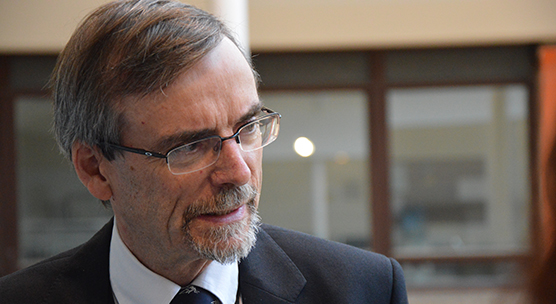Study to establish bowel cancer `risk score’
Published On Wed 22 Apr 2015 by Roddy Isles

Leading experts in bowel cancer screening at the University of Dundee are launching a research project to develop a new `risk score’ for patients that could lead to more effective identification of those at risk from the disease.
The researchers say a practical risk assessment for GPs could lead to quicker diagnosis, save thousands of people every year from undergoing unnecessary colonoscopies, and save the NHS millions of pounds.
Bob Steele, Professor of Surgery and Head of Cancer Research at the University of Dundee, said, “The idea is to try and develop a risk score for patients with bowel symptoms so that we can more easily identify those who are needing an urgent colonoscopy.
“This would avoid many people having to undergo invasive investigations such as colonoscopies, which carry a small risk in themselves. The NHS would save money by not having to carry out unnecessary investigations and the people who do need them would be able to be attended to more quickly.”
Professor Steele will lead the £300,000 study over the next two years. The project is funded by the Chief Scientist Office of the Scottish Government.
Professor Steele said there are difficulties in identifying those patients who may need urgent attention, in part due to the fact that the symptoms of bowel cancer are common and often caused by minor upsets.
“The main symptoms for bowel cancer are everyday occurrences – everyone sees change from day to day in their movements,” he said.
“At present we do encourage people to go and see their GP early if, for instance, they are noticing traces of blood. We hope this study will ultimately assist GPs to identify cancers at an earlier stage by giving them a tool to identify those patients who really do need urgent attention, and allow reassurance and further checks to be given to others who don’t.”
The project will trial the use of a series of measurements and questions to determine whether an effective risk score can be developed for use by GPs.
“What we are looking at are things like age, gender, body mass index, waist circumference and blood count, and patients will be asked questions regarding diet and exercise,” said Professor Steele. “The novel thing is we will also use a faecal immunochemical test to quantify the amount of blood in the stool.”
There are approximately 3500 new cases of bowel cancer identified in Scotland every year and the disease is responsible for around 1700 deaths in the country every year.
Professor Steele is Director of the Scottish Colorectal Cancer Screening Programme, having acted as clinical lead for the UK demonstration pilot that was used to inform the decision to introduce national screening programmes throughout the United Kingdom.
NOTES TO EDITORS
THE UNIVERSITY OF DUNDEE
The University of Dundee is internationally recognised for the quality of its teaching and research and has a core mission to transform lives across society. More than 17,000 students are enrolled at Dundee, helping make the city Scotland’s most student-friendly. With high-quality teaching, world-leading research, and a £200 million investment in a compact, friendly campus with an unrivalled position in the heart of the city centre, the University of Dundee has been rated number one in Scotland for the past six years in the Times Higher Education Student Experience Survey. We send more graduates into the professions than any other institution in Scotland and our graduates enjoy some of the highest starting salaries in the UK. See www.dundee.ac.uk for further details.
Roddy Isles
Head of Press
TEL: 01382 384910
MOBILE: 07800 581902
E-MAIL: r.isles@dundee.ac.uk